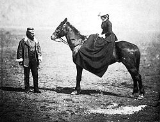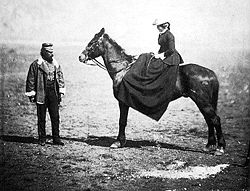
Frances Isabella Duberly
Encyclopedia

Crimean War
The Crimean War was a conflict fought between the Russian Empire and an alliance of the French Empire, the British Empire, the Ottoman Empire, and the Kingdom of Sardinia. The war was part of a long-running contest between the major European powers for influence over territories of the declining...
and Sepoy Mutiny
Indian Rebellion of 1857
The Indian Rebellion of 1857 began as a mutiny of sepoys of the British East India Company's army on 10 May 1857, in the town of Meerut, and soon escalated into other mutinies and civilian rebellions largely in the upper Gangetic plain and central India, with the major hostilities confined to...
. Her husband, Captain Henry Duberly, was the paymaster
Paymaster
A paymaster often is, but is not required to be, a lawyer . When dealing with commission payments on contracts dealing with large amounts of money , most banks in the United States are very wary of handling such large amounts of money...
to the 8th Royal Irish Hussars, part of the famed Light Brigade of Balaclava
Charge of the Light Brigade
The Charge of the Light Brigade was a charge of British cavalry led by Lord Cardigan against Russian forces during the Battle of Balaclava on 25 October 1854 in the Crimean War. The charge was the result of a miscommunication in such a way that the brigade attempted a much more difficult objective...
. The published journal of her time in the Crimea
Crimea
Crimea , or the Autonomous Republic of Crimea , is a sub-national unit, an autonomous republic, of Ukraine. It is located on the northern coast of the Black Sea, occupying a peninsula of the same name...
(Journal Kept During the Russian War) not only includes splendid accounts of what she saw, but also is a good record of all the rumors and gossip of the army.
Early history
Born Frances Isabella Locke in 1829, the daughter of a WiltshireWiltshire
Wiltshire is a ceremonial county in South West England. It is landlocked and borders the counties of Dorset, Somerset, Hampshire, Gloucestershire, Oxfordshire and Berkshire. It contains the unitary authority of Swindon and covers...
banker, Wadham Locke, she has been described as “a splendid rider, witty, ambitious, daring, lively, loquacious and gregarious.” She certainly possessed the physical requirements and tough attitude required of her surroundings: “was awoke by the reveille at half-past two; rose, packed our bedding and tent, got a stale egg and a mouthful of brandy, and was in my saddle by half-past five.”
After the death of her mother in 1838, she moved to live with her eldest brother (also Wadham Locke) at Ashton Gifford House
Ashton Gifford House
Ashton Gifford House is a Grade II listed building in the hamlet of Ashton Gifford, part of the civil parish of Codford in the English county of Wiltshire. The house was built during the early 19th century, following the precepts of Georgian architecture, and its estate eventually included all of...
in Wiltshire. She left Ashton Gifford on her marriage in 1845 - which took place shortly after her brother had married for a second time.
In the Crimea
She travelled with her husband to the Crimea in 1854 and stayed with him throughout his time there, despite the protests of commanders such as Lord Lucan. As the only woman at the front-lines, she was of course the center of much attention. She was told of planned attacks ahead of time, giving her the opportunity to be in a good position to witness them. Such was the case at the Battle of BalaclavaBattle of Balaclava
The Battle of Balaclava, fought on 25 October 1854 during the Crimean War, was part of the Anglo-French-Turkish campaign to capture the port and fortress of Sevastopol, Russia's principal naval base on the Black Sea...
, where her journey from camp to meet up with Henry and watch the battle took her quite close to the enemy. Though her husband survived the day (being away on Staff duties), many of her friends did not: “Even my closed eyelids were filled with the ruddy glare of blood.” Being so close to the front line
Front line
A front line is the farthest-most forward position of an armed force's personnel and equipment - generally in respect of maritime or land forces. Forward Line of Own Troops , or Forward Edge of Battle Area are technical terms used by all branches of the armed services...
in one of the first ‘modern’ wars, Mrs. Duberly differed from many of her compatriots back home in realizing the reality of it all; when her husband asked if she wanted to view the aftermath of the Battle of Inkermann she told him she could not, “The thought of it made me shutter [sic] and turn sick.”
Public opinion
Mrs. Duberly’s adventurous actions did not always sit well with society. She was pointedly snubbed at the Royal review of her husband’s regiment after the war. The journal she published after the war originally had been intended with a dedication to Queen VictoriaVictoria of the United Kingdom
Victoria was the monarch of the United Kingdom of Great Britain and Ireland from 20 June 1837 until her death. From 1 May 1876, she used the additional title of Empress of India....
, but this was refused, much to her dismay. Nonetheless she was popular with the troops (who nicknamed her ‘Mrs. Jubilee’) and many of the people back in England. Her published journal met with some success, and prints of a photo of her taken by Roger Fenton
Roger Fenton
Roger Fenton was a pioneering British photographer, one of the first war photographers.-Early life:Roger Fenton was born in Crimble Hall, Heap, Bury, Lancashire, 28 March 1819. His grandfather was a wealthy cotton manufacturer and banker, his father a banker and Member of Parliament...
sold quite well.
India
Mrs. Duberly again accompanied her husband when the 8th Hussars were sent to IndiaIndia
India , officially the Republic of India , is a country in South Asia. It is the seventh-largest country by geographical area, the second-most populous country with over 1.2 billion people, and the most populous democracy in the world...
in 1856. There she stayed with him throughout his time campaigning during the final months of the Sepoy Mutiny. She was adamant about going along with the troops, she told her sister that she would “stain my face and hands and adopt the Hindoo
Hindu
Hindu refers to an identity associated with the philosophical, religious and cultural systems that are indigenous to the Indian subcontinent. As used in the Constitution of India, the word "Hindu" is also attributed to all persons professing any Indian religion...
caftan and turban
Turban
In English, Turban refers to several types of headwear popularly worn in the Middle East, North Africa, Punjab, Jamaica and Southwest Asia. A commonly used synonym is Pagri, the Indian word for turban.-Styles:...
…I ain’t going to stay behind.” At Gwalior in 1858, while watching the start of a cavalry
Cavalry
Cavalry or horsemen were soldiers or warriors who fought mounted on horseback. Cavalry were historically the third oldest and the most mobile of the combat arms...
charge her horse sprung off with the rest and, instead of holding back, she told her husband “I must go!” and so she did.
Married life
She was undoubtedly a great friend of and supporter of her husband, who never seemed to be jealous of his wife as the center of attention in the all-male environment of the Victorian Army in the field. Indeed, she saw Henry as “a friend I am obliged to support.” Henry was suffering from heavy illness when the time came to go ashore in the Crimea, she told her sister that “Lord CardiganJames Brudenell, 7th Earl of Cardigan
Lieutenant General James Thomas Brudenell, 7th Earl of Cardigan, KCB , was an officer in the British Army who commanded the Light Brigade during the Crimean War...
intends him to land with the troops, but I don’t intend him to do so.” Of course, the two had their differences of opinion on the nature of military service, when orders came from Lord Lucan for her to be put ashore in Constantinople
Constantinople
Constantinople was the capital of the Roman, Eastern Roman, Byzantine, Latin, and Ottoman Empires. Throughout most of the Middle Ages, Constantinople was Europe's largest and wealthiest city.-Names:...
she wrote that Henry “looks upon the order as a soldier; I as a woman, and laugh at it.”
Later life
She and her husband returned to EnglandEngland
England is a country that is part of the United Kingdom. It shares land borders with Scotland to the north and Wales to the west; the Irish Sea is to the north west, the Celtic Sea to the south west, with the North Sea to the east and the English Channel to the south separating it from continental...
in 1864. The images she had seen on her campaigns stuck with her, and when asked to reminisce about what she had witnessed, she replied “those days are best forgotten.” Nevertheless, her adventurous spirit remained; she complained to a nephew in 1896, “I cannot stand dullness for long, and life gets duller and duller as one gets older.” Seven years later she died in Cheltenham
Cheltenham
Cheltenham , also known as Cheltenham Spa, is a large spa town and borough in Gloucestershire, on the edge of the Cotswolds in the South-West region of England. It is the home of the flagship race of British steeplechase horse racing, the Gold Cup, the main event of the Cheltenham Festival held...
, having reached the grand old age of 73.
She had no children.
See also
Mrs Duberly's War: Journal and Letters from the Crimea, 1854-1856 Edited by Christine Kelly Published by Oxford University PressOxford University Press
Oxford University Press is the largest university press in the world. It is a department of the University of Oxford and is governed by a group of 15 academics appointed by the Vice-Chancellor known as the Delegates of the Press. They are headed by the Secretary to the Delegates, who serves as...
. ISBN 978-0-19-920861-6 or ISBN 0-19-920861-1
External links
Duberly, Mrs. Henry. Journal Kept During The Russian War London: Longman, Brown, Green, and Longmans, 1856. http://digital.library.upenn.edu/women/duberly/journal/journal.htmlSources
- Barham, John. “The Indomitable Duberly.”, June 29, 2006
- Farwell, ByronByron FarwellByron Edgar Farwell was an American military historian and biographer.-Biography:Farwell graduated from Ohio State University and the University of Chicago...
. Queen Victoria’s Little Wars. New York: W. W. Norton, 1985. - Warner, Philip. The Crimean War, A Reappraisal. New York: Taplinger, 1972.

